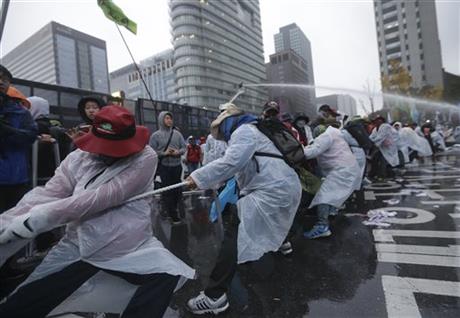Scores held as biggest rally in years in Seoul turns violent
SEOUL: Police detained more than 50 protesters and were seeking out others Sunday after violent clashes marred the largest anti-government demonstrations in South Korea's capital in more than seven years.
Police fired tear gas and water cannons on Saturday to disperse about 70,000 people allied with labor, civic and farmers' groups, who took to the streets to rally against conservative President Park Geun-hye. The activists oppose Park's business-friendly labor policies and a decision to require middle and high schools to use only state-issued history textbooks starting in 2017.
A 69-year-old farmer, Baek Nam-gi, remained unconscious at a hospital after he fell and injured his head as police doused him with water cannons near City Hall, said Cho Byung-ok, secretary general of the Korea Peasants League.
Video footage showed Baek lying motionless as other demonstrators struggled to drag him away and police continued to fire water cannons from atop police buses.
Police said they have detained 51 people and could possibly bring in more, including those who they believe might had larger roles in organizing the protests.
Kim Sung-soo, spokesman of the country's main opposition party New Politics Alliance for Democracy, released a statement criticizing the "excessively violent" police suppression of the protest, which he said was responsible for Baek's injury.
The protesters, many of them masked, carried banners and chanted "Park Geun-hye, step down" and "No to layoffs," as they occupied a major downtown street. Some of them clashed with police, who created tight perimeters with buses to block them.
Protesters tried to move some of the buses by pulling ropes they had tied to the vehicles, and police, wearing helmets and body armor, responded by firing tear gas and water cannons.
Labor groups have been denouncing government attempts to change labor laws to allow larger freedom for companies in laying off workers, which policymakers say would be critical in improving a bleak job market for young people.
Government critics also say that state-issued history textbooks, which have not been written yet, would be politically driven and might attempt to whitewash the brutal dictatorships that preceded South Korea's bloody transition toward democracy in the 1980s.
President Park is the daughter of slain military dictator Park Chung-hee, who ruled South Korea in the 1960s and '70s, and whose legacy as a successful economic strategist is marred by records of severe oppression.






